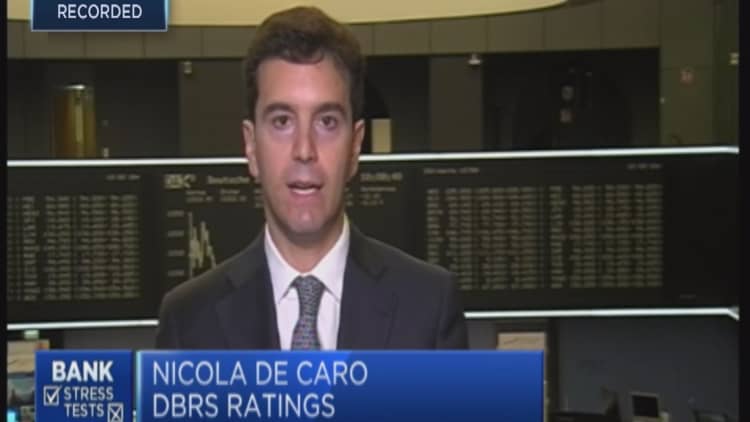
The Italian banking system came under pressure on Monday morning, after shares in the country's largest four lenders fell despite an overall positive result in the latest stress tests conducted by the European Banking Authority (EBA).
Banco BPM sank 3.4 percent; UniCredit dropped more than 1.6 percent; and Ubi Banca was down by 1.8 percent in late-morning trade in Europe. Meanwhile, Intesa Sanpaolo's shares got further hit, down 2.2 percent on the back of a Goldman Sachs downgrade on Friday. The investment bank said that Intesa is "well-managed" and has a "comfortable capital position." However, it expects the profitability of the bank to be dented by a "deteriorating macro-outlook," Reuters reported.
However, analysts told CNBC that the fall in shares on Monday highlighted a number of concerns surrounding Italy.
"The stress tests results were actually broadly positive on the Italian banks. However, I feel that the shares are down as questions are beginning to be raised in regards to the expectations for Italy for next year," Tom Kinmonth, fixed income strategist at ABN Amro told CNBC via email Monday.
The four banks registered a capital ratio in the adverse scenario above 5.5 percent —the threshold that analysts use to know whether a bank passed or failed stress tests. Out of the four, Banco BPM had the lowest capital ratio in the adverse scenario at 6.7 percent. This figure is essentially the cash buffer it has in the event of a financial crisis.
Meanwhile, analysts at Capital Economics said that despite the results, Italian banks "are still a source of discomfort." This is because "the economic assumptions underlying that analysis are a little too optimistic."
The EBA assessed the banks' 2017 balance sheet and in effect looked at data before the change in government in Rome.
"If the EBA were to come up with a baseline scenario today, it would presumably show slower growth than it had previously assumed. And they would also need to factor in the hit to banks' capital as a result of the increase in bond yields," Jack Allen, senior European economist at Capital Economics told CNBC via email Monday.
The new anti-establishment government in Italy, appointed in June, has promised to challenge European fiscal rules. As a result, concerns over the country's ability to repay its debts have grown and that has dented Italian lenders, given that they are one of the main holders of Italian debt.
"Of course, (the more recent data) wouldn't spell disaster for Italy's banks in the baseline scenario. But it suggests that things might not be as rosy as the stress tests imply," Allen also said.
Due to the government's repeated stance to increase public spending in the coming years, analysts have become more concerned about the growth rate in the third largest euro economy in the following years.
Nicola de Caro, SVP Financial Institutions at DBRS, told CNBC's "Street Signs" that the stress tests were also positive because the assumption of market volatility on Italian debt was "softer" compared to the levels that have already been hit earlier this year.
"The assumption on the sovereign spreads were softer given the performance that we have seen since May 2018, especially with regards to Italy," he said.
The yield on the 10-year Italian paper rose on Monday, showing that Italy remains a top worry for investors. The yield hit 3.35 percent at around 12pm London time.
"Italy, is our biggest concern. There are two big issues bubbling under the surface, one related to the weaker banks, the other, politics," ABN Amro said in a note to clients in August.
Shares in Banco BPM are down more than 34 percent this year. UniCredit and Intesa Sanpaolo are also down about 25 and 28 percent, respectively.



